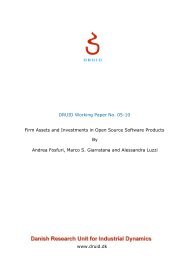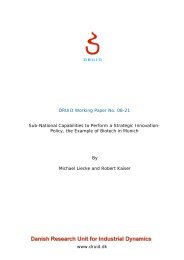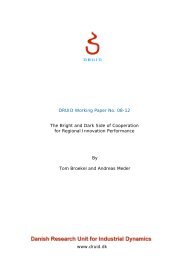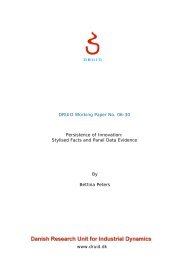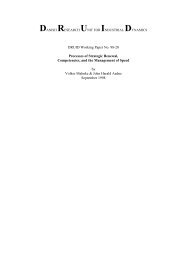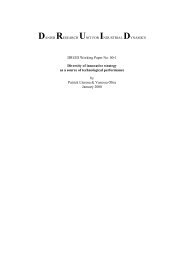danish research unit for industrial dynamics druid working paper no ...
danish research unit for industrial dynamics druid working paper no ...
danish research unit for industrial dynamics druid working paper no ...
Create successful ePaper yourself
Turn your PDF publications into a flip-book with our unique Google optimized e-Paper software.
15It is worth pointing out that such cognitive coordination can be achieved through differentorganisational set-ups, ranging from highly centralised creation of codes, routines andpractices which create and maintain a widely shared k<strong>no</strong>wledge basis, to highlydecentralised systems of k<strong>no</strong>wledge sharing and communication which instead generatesystems of local codes, routines and practices (cf., <strong>for</strong> some comparative analyses ofdifferent organisational set-ups, Crémer, 1992, Marengo, 1996).Related to the trade-off between tacitness and codification, the trade-off betweencommonality and diversity and the trade-off between centralisation and decentralisation, isa<strong>no</strong>ther fundamental “cognitive” trade-off which we believe constitutes a key dimension <strong>for</strong>the analysis of organisational <strong>for</strong>ms: it is the trade off between generality and specificity.Generality of k<strong>no</strong>wledge involves the possibility of applying it to a broad range of domains(Arora and Gambardella, 1994). Thus general k<strong>no</strong>wledge is more likely to be redeployed,articulated in widely shared categories, and thus also more likely to be commonly sharedand homogeneously distributed, and also more likely to be centralised. Fleck, in hisdescription of the implementation of engineering systems, makes a similar distinctionbetween generic and local k<strong>no</strong>wledge: "The local practical k<strong>no</strong>wledge is highly contingentto the particular firm concerned. It deals with the specific 'k<strong>no</strong>wledge base' built up overmany years of experience in carrying out the firm's business. Moreover, this localcomponent is usually distributed among the many operatives involved in day-to-dayactivities. In many cases, this k<strong>no</strong>wledge is tacitly embodied in skills and practices whichhave been gradually <strong>for</strong>med over a period and are <strong>no</strong>t available in any other centralised or<strong>for</strong>malised <strong>for</strong>m" (Fleck, 1994, pp. 641-642).discussion on those aspects, see Balconi (1997). Here in our discussion, we are refering more particularlyon tacit k<strong>no</strong>wledge "à la Rosenberg" or "tacit k<strong>no</strong>wledge à la Dosi".



